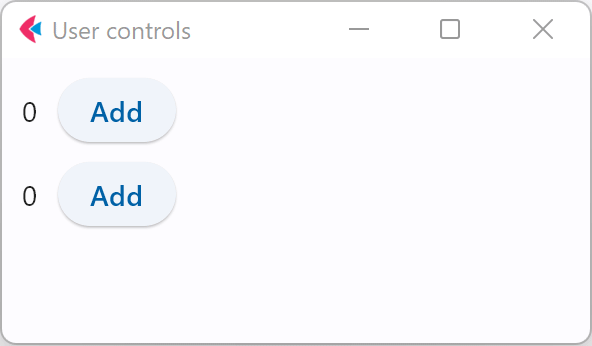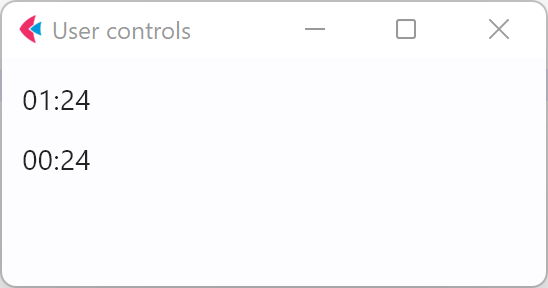User controls
User control (UserControl) allows building isolated re-usable components by combining existing Flet controls. User control behaves like a Control, could have methods and properties.
Below is a minimal example of user control:
import flet as ft
class GreeterControl(ft.UserControl):
def build(self):
return ft.Text("Hello!")
def main(page):
page.add(GreeterControl())
ft.app(target=main)
UserControl must implement build() method that is called to build control's UI and should returns a single Control instance or a List of controls. UserControl is inherited from Stack, so multiple children will be arranged on top of each other. If you need to arrange control's UI differently use Row, Column or other layout controls, for example:
class GreeterControl(ft.UserControl):
def build(self):
return ft.Column([
ft.TextField(label="Your name"),
ft.ElevatedButton("Login")
])
UserControl is isolated from outside layout, i.e. when update() method is called for the parent control any changes inside the UserControl are not included into the update digest. UserControl should call self.update() to push its changes to a Flet page, for example:
import flet as ft
class Counter(ft.UserControl):
def add_click(self, e):
self.counter += 1
self.text.value = str(self.counter)
self.update()
def build(self):
self.counter = 0
self.text = ft.Text(str(self.counter))
return ft.Row([self.text, ft.ElevatedButton("Add", on_click=self.add_click)])
def main(page):
page.add(Counter(), Counter())
ft.app(target=main)

You could either declare event handlers (e.g. def add_click(self, e)) and control references (e.g. self.text) as class members or implement all UserControl's logic inside build() method using local variables and inner functions. For example, the code above could be rewritten as:
class Counter(ft.UserControl):
def build(self):
self.counter = 0
text = ft.Text(str(self.counter))
def add_click(e):
self.counter += 1
text.value = str(self.counter)
self.update()
return ft.Row([text, ft.ElevatedButton("Add", on_click=add_click)])
counter cannot be declared as a local variable as it won't be visible inside add_click method, so it must be declared as a class field self.counter.
User control can have a constructor to pass custom data, for example:
import flet as ft
class Counter(ft.UserControl):
def __init__(self, initial_count):
super().__init__()
self.counter = initial_count
def build(self):
text = ft.Text(str(self.counter))
def add_click(e):
self.counter += 1
text.value = str(self.counter)
self.update()
return ft.Row([text, ft.ElevatedButton("Add", on_click=add_click)])
# then use the control
def main(page):
page.add(
Counter(100),
Counter(200))
ft.app(target=main)
super().__init__() must be always called in your own constructor.
User control provides life-cycle "hook" methods:
did_mount()- called after theUserControladded to a page and assigned transientid.will_unmount()- called before theUserControlis removed from a page.
Using those methods we could implement a simple "countdown" control:
import flet as ft
import time, threading
class Countdown(ft.UserControl):
def __init__(self, seconds):
super().__init__()
self.seconds = seconds
def did_mount(self):
self.running = True
self.th = threading.Thread(target=self.update_timer, args=(), daemon=True)
self.th.start()
def will_unmount(self):
self.running = False
def update_timer(self):
while self.seconds and self.running:
mins, secs = divmod(self.seconds, 60)
self.countdown.value = "{:02d}:{:02d}".format(mins, secs)
self.update()
time.sleep(1)
self.seconds -= 1
def build(self):
self.countdown = ft.Text()
return self.countdown
def main(page: ft.Page):
page.add(Countdown(120), Countdown(60))
ft.app(target=main)
